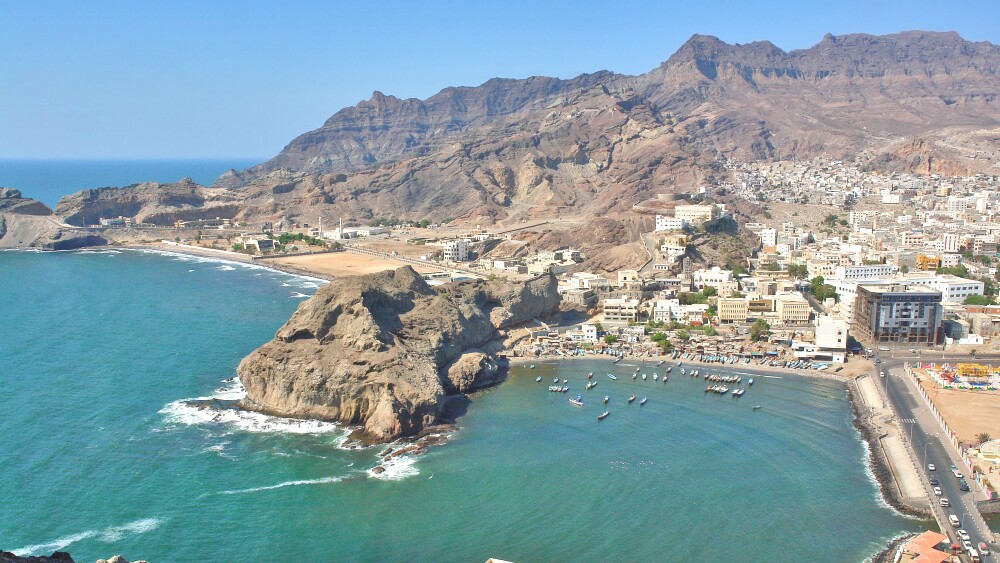Speaking at the UN last month, Yemeni president Rashid al-Alimi called for an international coalition to counter the Houthis in his address to the United Nations General Assembly. A multilateral effort to counter Houthi weapons smuggling would be a great starting point for such an effort. Luckily, one was recently announced, and the United States should support it.
The United States could increase its intelligence sharing and potential logistics support to the coast guard, thereby improving its ability to identify targets and conduct continuous operations.
On September 16, the United Kingdom and Saudi Arabia launched the Yemen Maritime Security Partnership (YMSP) to develop Yemen’s Coast Guard and support it in protecting maritime trade, counter smuggling, and combating piracy off Yemen’s shores. The YMSP conference was attended by representatives from 30 countries and five international organizations, including the United States. It received millions of dollars in initial pledges, with the United Kingdom and Saudi Arabia each pledging $4 million, and another €2 million from the European Union.
The United Kingdom has previously undertaken substantial efforts to support Yemen’s Coast Guard, and Saudi Arabia, the United States, the United Nations, and other countries have also contributed in the past. Despite this support, Maj. Gen. Khalid al-Qamali, head of Yemen’s Coast Guard Authority, insists the force still lacks the resources necessary to meet its mission requirements. This new initiative should build upon earlier efforts to transform local counter-smuggling and counter-piracy efforts in Yemen.
To address this shortfall, the United States should increase its financial, material, and military support of the UK- and Saudi-led YMSP. The financial piece is straightforward. For a relatively small amount of money, compared to the annual US military budget, the United States can significantly enhance Yemeni capabilities. Supplies of more advanced weapons or sensors could achieve the same effect, extending the coast guard’s range, enhancing interoperability with coalition forces, and increasing lethality against Houthi forces.
Militarily, the United States could offer a series of Theater Security Cooperation engagements that upgrade the level of training for the Yemeni forces. Even more impactful, the United States could increase its intelligence sharing and potential logistics support to the coast guard, thereby improving its ability to identify targets and conduct continuous operations.
One of the most important aspects of this initiative is the potential to enhance local counter-smuggling efforts at a crucial moment in the Red Sea.
This participation in YMSP directly aligns with the Trump administration’s goal of maximizing its return on foreign policy investments through low-cost efforts where local forces play a leading role and direct risk to US servicemembers is mitigated. At the same time, this program adds the local forces to the ongoing Western effort to secure freedom of navigation in a waterway vital to the global economy.
One of the most important aspects of this initiative is the potential to enhance local counter-smuggling efforts at a crucial moment in the Red Sea. After nearly two years of attacks on Israel and commercial shipping, the Houthis are not growing weary of conflict. They endured over 1,000 American strikes during Operation Rough Rider and continue to weather ongoing, periodic Israeli strikes that have hit their weapons and command infrastructure. Improved weapons interception capabilities would enable the United States and its allies to significantly hinder Iranian efforts to rearm and supply the Yemeni terror group and reduce its ability to wage war.
To enhance the reach and strengthen the effectiveness of counter-smuggling efforts, YMSP should support more than just Yemen’s Coast Guard. The Yemeni National Resistance Forces, who operate on the Red Sea coast and have proven effective at intercepting Houthi smuggling, should be included in resource allocation, training opportunities, and intelligence sharing. Their capacity was demonstrated by their seizure of 750 tons of weapons en route to the Iran-backed terror group this summer. With improvements, these forces could expand the Area of Operations (AO) against the Houthis.
Additionally, the Southern Transitional Council (STC) controls the port of Aden. Following Israeli and American airstrikes on Hodeidah that damaged the port, STC forces intercepted weapon parts and drone components intended for the Houthis, which were forced to reroute through the port of Aden. By supporting additional forces, YMSP can expand the reach and effectiveness of these interdiction efforts while encouraging further cooperation within the anti-Houthi coalition.
A Yemen that can defeat the Houthis and work with the United States and its allies to thwart Iranian ambitions is an objective worth pursuing.
The initiative should also serve as the primary vehicle for global support to Yemeni Coast Guard forces, ensuring all funds and resources are distributed in a manner consistent with specified priorities. Furthermore, donor countries should maintain oversight of spending. This not only secures the financial pipeline and prevents waste, fraud, and abuse but also increases the legitimacy of overall efforts. This can have exponential impacts on the standing of the Yemeni government on the global stage and can lead to continued and increasing investments in its future.
The YMSP is an important step in building the capacity of the Yemenis to take their country back from the Houthis. If the United States is serious about securing the Red Sea, it must fully support this initiative and help it realize its full potential. A Yemen that can defeat the Houthis and work with the United States and its allies to thwart Iranian ambitions is an objective worth pursuing. By doing so, the United States would not only enable Yemen to work towards a future without the Houthi threat, but it would also bolster its own national security aims in the Middle East.
Bridget Toomey is a research analyst at FDD. Bridget on X: @BridgetKToomey.
Published originally on October 8, 2025.








